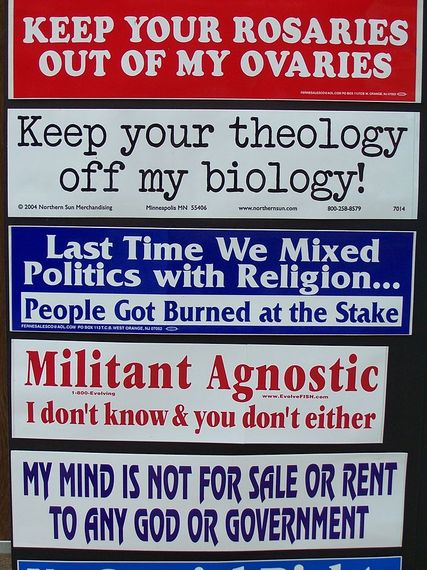Traditional religions and their beliefs in gods are on the decline in America no matter how you measure it: one in five Americans have no religion according to the Pew Forum on Religion and Public Life, less people attend religious services than they publicly claim according to the Public Religion Research Institute, and the number of open atheists has doubled since 2007 according to a Harris Poll. Yet political acceptance of atheism has lagged behind social acceptance, with more than half of Americans saying that they wouldn't vote for an atheist candidate for president according to a new survey by Pew.
True, this figure improved ten percentage points since 2007, and the Pew study also highlighted that over 40% of Americans don't care about the religious beliefs of a candidate. But this increase in political acceptance of atheists doesn't fully reflect the more rapidly increasing popularity of rejecting divine revelation and ancient texts. Even more disturbing, the study shows that other "taboos" such as drug usage and adultery by a candidate are becoming more acceptable at a faster rate than for the taboo of atheism.
What does it say about our country when we are willing to elect leaders who cheat and lie and break the law over atheists who live ethically? Do we as a nation truly believe that the theological beliefs of a candidate are more important than how that person actually lives their life? The answer for now is yes.
People who proclaim a belief in a deity are for some reason seen as more trustworthy and morale than those who don't, regardless of whether or not religious people actually live up to the values that they proclaim to be endorsed by God. Perhaps this is why people claimed to attend religious services when they actually didn't, because society reinforces the idea that being a religious person means that you are good and trustworthy.
While this blind deferral towards religious candidates may change in the future because of shifting religious demographics, we must now grapple with the consequences of this political prejudice. That means we will have to deal with legions of government officials like United States Representative Vance McAllister, a religious conservative that is in hot water for carrying on an affair with a married staffer in one of his district offices. These officials, who proclaim their faith as a virtue and publicly pray in order to prove their religious bona fides, are often revealed to be nothing more than charlatans using religion as a cover for their personal failings. But unfortunately, voters aren't willing to look much deeper than the religious beliefs of an individual when evaluating whether or not that person is ethical, so this religious masquerade is still an effective tool for those with a questionable history that want to be elected to public office.
Prejudice against atheists remains very real, and our political system is among the most open arenas in which it can be applied. Until this prejudice is openly rejected many Americans will continue to feel estranged from the political process and our political system as a whole will continue to be infiltrated by those that are ethically unworthy to serve as representatives of the people.
